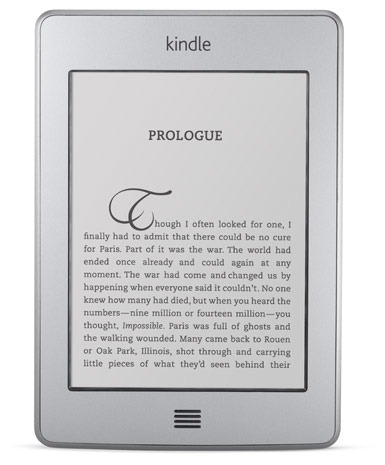 Blogger James W. Harris has been thinking about the effects the Kindle is having on the science fiction genre. Looking at Amazon’s Top 100 lists for paid and free e-books in the SF genre, he notices many unknown, usually self-published, authors grabbing up position on both lists, and a lot of books by classic SF authors (such as his favorite, Robert A. Heinlein) aren’t even on the list. Harris finds a lot of new writers are taking a cue from Amazon’s sales technique of lowering the price of a book for a few days to get attention and then raising the price.
Blogger James W. Harris has been thinking about the effects the Kindle is having on the science fiction genre. Looking at Amazon’s Top 100 lists for paid and free e-books in the SF genre, he notices many unknown, usually self-published, authors grabbing up position on both lists, and a lot of books by classic SF authors (such as his favorite, Robert A. Heinlein) aren’t even on the list. Harris finds a lot of new writers are taking a cue from Amazon’s sales technique of lowering the price of a book for a few days to get attention and then raising the price.
If you look at Locus Bestsellers for March 2012, many of their books aren’t on the Kindle bestseller list. If you look at Amazon’s Best Sellers in Science Fiction general list that includes printed books and Kindle books, the makeup of this list is different, but the Kindle books are having a huge impact. Here is the Science Fiction Book Club Top 100 Bestsellers. Notice how it’s dominated by series, media tie-ins and non-science fiction titles. The SFBC has little science fiction. Not so for the Kindle list. Evidently would-be writers are very anxious to write science fiction and readers are finding it on Amazon to consume in mass quantities on their Kindles.
Harris calls the free e-books list a “universal slush pile,” though I think that may not be quite correct. After all, that list only shows the hundred books that the most people have found to be worth downloading, and that filters out all but an infinitesimal fraction of a percent of all the books offered for free on Amazon. If it has any relation to a slush pile, it’s what’s left of the pile after all the obvious dross has been removed.
And on the other hand, Harris feels that science fiction has lost much of its vitality in recent years, with writers trying to build book sales rather than coming up with original and far-out ideas. Perhaps self-publishing can do something about that.
I find the focus on science fiction interesting, as it’s long seemed to me that the science fiction genre is a sort of literary world unto itself. Its readers band together and hold annual events to celebrate their genre. They tend to be early adopters—indeed, the very existence of an e-book reader itself was originally predicted by science fiction. And one of the pioneers of commercial e-book sales was Baen, a science fiction publisher. Perhaps SF is the natural genre of e-books.































From the headline, I expected this to be about how hard it is to predict the future while we’re all living it! I certainly find that true.
I’m an avid SF reader but the genre seems to be zombies, vampires, series after series. Even Baen has succumb to the series bug. Must be simple for the authors to crank out. Boo.
dave, Baen was doing “series” and “spoitation” books long before ebooks happened. Just like everyone else, in fact.
*****
“Looking at Amazon’s Top 100 lists for paid and free e-books in the SF genre, [Harris] notices many unknown, usually self-published, authors grabbing up position on both lists, and a lot of books by classic SF authors (such as his favorite, Robert A. Heinlein) aren’t even on the list.”
Oh no! The proles are just reading whatever they want instead of The Good Stuff! What happens next? They’ll start creating their own ideas about what the future is supposed to look like!
The series format is what I love about sci-fi. I want to be with the characters a little bit longer. Marion Zimmer Bradley’s Darkover novels comes to mind; but rather than fantasy books which is one long story told in three or, heaven forbid, more parts (Robert Jordan’s Wheel of Time), most sci-fi series’ novels can stand on their own and be read alone. It’s just more stories in the same universe, and I dont’ see anything bad about that at all.
If Heinlein isn’t selling in ebook format it’s because he didn’t write many stories with a supernatural theme. And I suspect his themes of science, nationalism, self sufficiency, and individualism just don’t resonate with modern readers.
To say nothing of the cost for one of his books in ebook format.
Elizabeth – I agree with you fully. There is an enormous amount of snobbery surrounding ‘series’ writing. Writers write series because readers love them.